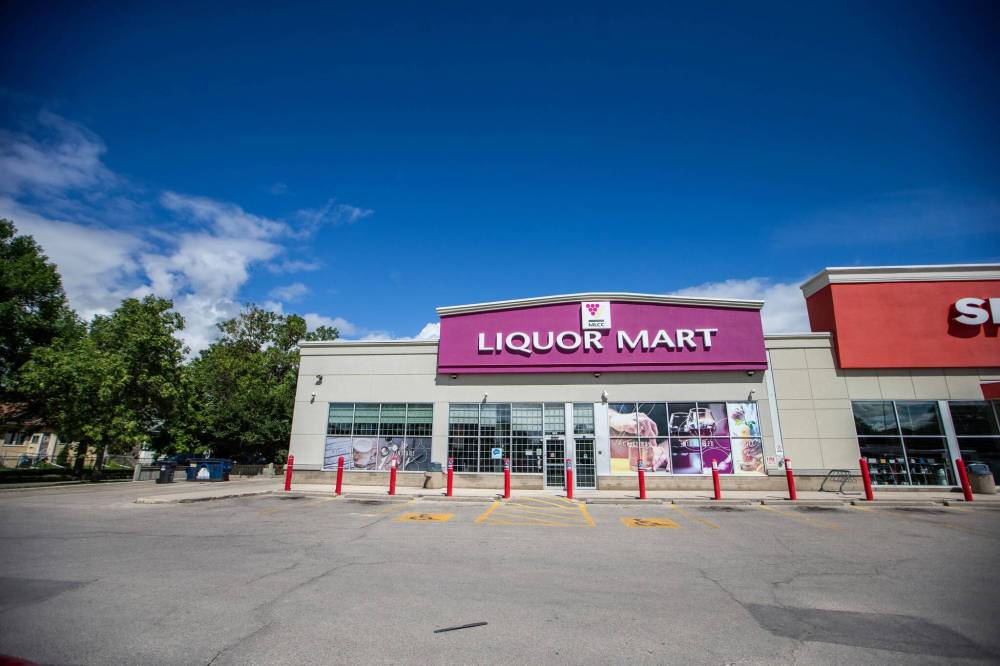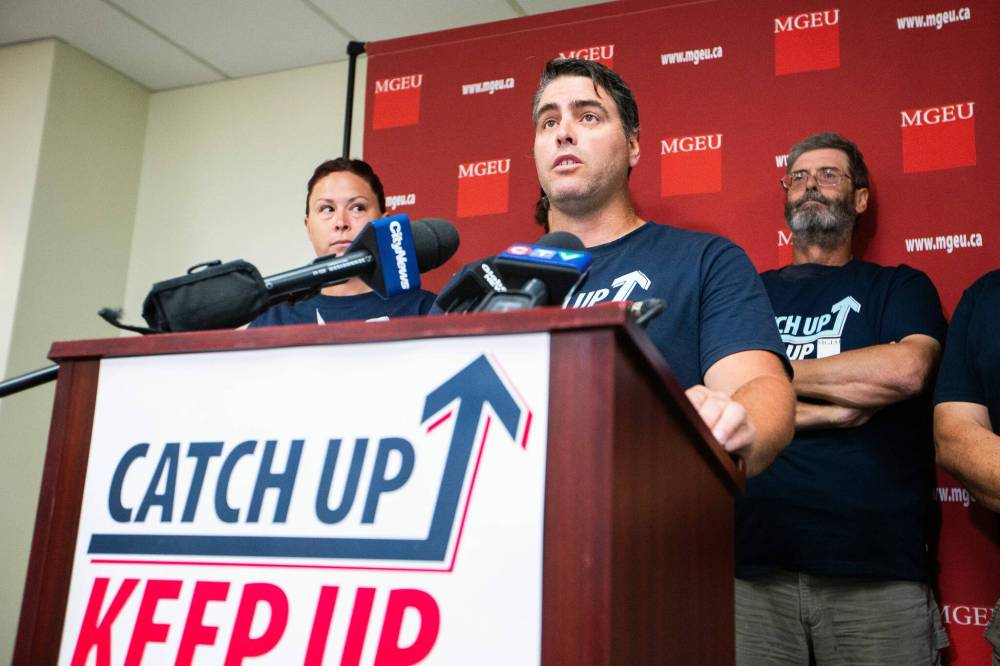Liquor Mart strike plan hangs rural communities out to dry, mayors say
Advertisement
Read this article for free:
or
Already have an account? Log in here »
To continue reading, please subscribe:
Monthly Digital Subscription
$0 for the first 4 weeks*
- Enjoy unlimited reading on winnipegfreepress.com
- Read the E-Edition, our digital replica newspaper
- Access News Break, our award-winning app
- Play interactive puzzles
*No charge for 4 weeks then price increases to the regular rate of $19.95 plus GST every four weeks. Offer available to new and qualified returning subscribers only. Cancel any time.
Monthly Digital Subscription
$4.99/week*
- Enjoy unlimited reading on winnipegfreepress.com
- Read the E-Edition, our digital replica newspaper
- Access News Break, our award-winning app
- Play interactive puzzles
*Billed as $19.95 plus GST every four weeks. Cancel any time.
To continue reading, please subscribe:
Add Free Press access to your Brandon Sun subscription for only an additional
$1 for the first 4 weeks*
*Your next subscription payment will increase by $1.00 and you will be charged $16.99 plus GST for four weeks. After four weeks, your payment will increase to $23.99 plus GST every four weeks.
Read unlimited articles for free today:
or
Already have an account? Log in here »
Hey there, time traveller!
This article was published 09/08/2023 (885 days ago), so information in it may no longer be current.
Manitoba Liquor and Lotteries is leaving many rural communities parched while it tries to deal with a strike by its 1,400 workers across the province, leaders outside the Perimeter Highway say.
The Crown corporation’s current contingency plan is keeping a handful of Liquor Marts in Winnipeg, Brandon and Thompson operating with limited hours, but has closed all of its other locations indefinitely.
The strike dragged into its second full day Wednesday.

MIKAELA MACKENZIE / WINNIPEG FREE PRESS
The MLL plans to keep a handful of Liquor Marts in Winnipeg, Brandon and Thompson operating with limited hours, but has closed all of its other locations indefinitely.
Beausejour Mayor Ray Schirle said people from communities without open Liquor Marts are driving to private vendors across rural Manitoba in hopes of finding booze.
Schirle is well-versed in the industry — he co-owns a campground resort with a private liquor vendor in Lac du Bonnet — and is watching the strike closely. If the strike were to end tomorrow, consumers and sellers in rural areas would be worse off than those in Winnipeg, he said.
“To get distribution back where everybody’s got stock, they’re going to fill up (Winnipeg) stores first, and rural Manitoba stores, they’re going to get second fiddle. That’s always (how it) has worked in the past,” he said.
“I don’t know how rural Manitoba stores are gonna get stocked, because the supply chain is so disrupted now. It’s going to take weeks, if not months.”
In Lac du Bonnet, Mayor Ken Lodge said rotating closures that began at outlets in July had little impact on the town’s population of just over 1,000, but the full strike has him increasingly concerned.
“When you’re a small community, especially a small rural community, where the options are few, where the population is small, where the distances are large to get anywhere, you can understand it’s a major, major issue,” he said.
”You now have, almost effectively, the effects of prohibition without actually having strived for it.”–Lac du Bonnet Mayor Ken Lodge
The closure of the lone Liquor Mart will have a trickle-down effect the longer it remains closed, he said. People visiting cottage country will often spend their money at other places while on the hunt to purchase alcohol.
“It’s been one of those situations where it’s kind of unique in the sense that you now have, almost effectively, the effects of prohibition without actually having strived for it,” Lodge said.
MLL offer includes signing bonuses
There was no movement in conciliation talks between the Manitoba Government and General Employees’ Union and MLL Tuesday afternoon, MGEU president Kyle Ross said, and called MLL president Gerry Sul’s comments suggesting the extent of the Crown corporation’s offer to members wasn’t being fully made clear “patronizing and insulting.”
“Our members know what fairness looks like and they have already made it clear that what’s on the table now does not come close to fair,” Ross said Wednesday.
A press release from MLL Wednesday included an infographic explaining the corporation’s current monetary offer, quoting Sul saying Manitobans “deserve to understand the real facts” about the strike, implying the union’s comments were caused by a “broader public agenda.”
Signing bonuses for employees who worked between 330 and 749 hours in the year prior to ratification would receive $600, those who worked up to 1,499 hours would receive $800 and those who worked more than 1,500 hours in the year prior would receive $1,000.
While MLL is offering a two per cent annual wage increase over four years, the infographic shared by MLL describes its offer as a 24.55 per cent wage increase over four years.
The current starting wage is $14.91 per hour. Should the current agreement be ratified, that would jump to $15.51, a 4.02 per cent increase, accounting for compounding two per cent wage increases over the past two years. When minimum wage increases in Manitoba in October, the starting wage will jump to $17.68 an hour to ensure those at the lowest pay grade are getting a bump of $2.38 an hour. It would then go up two per cent to $18.03 an hour in 2024. In 2025, employees would get a two per cent raise, along with an extra one per cent as a “special recruitment and retention adjustment” bonus, making the starting wage $18.57 per hour.
The starting wage under the current offer would be $3.66 higher per hour (or 24.55 per cent of $14.91) in 2025 than it is today.

MIKAELA MACKENZIE / WINNIPEG FREE PRESS FILES
There was no movement in conciliation talks between the Manitoba Government and General Employees’ Union and MLL Tuesday afternoon, MGEU president Kyle Ross said.
‘Our members don’t like it’
An MGEU spokesperson said those aspects of MLL’s offer were all publicly available to members and were soundly rejected.
“At member meetings in recent weeks, we’ve encouraged members to go have a look at it, so they can see it in the employer’s own words,” the spokesperson said.
“The employer’s problem isn’t that our members don’t know what’s in their offer. Their problem is that our members don’t like it.”
MGEU said the 24.55 per cent wage increase ladder described by MLL would apply only to seasonal workers and new hires, less than 20 per cent of the union’s membership, and only if those members stayed employed with MLL for four years. The vast majority of permanent long-term members would get a four-year total wage increase of eight or nine per cent, the union said.
MLL has said it has “repeatedly” asked MGEU to put the current offer to a vote. The first offer from MLL to MGEU included yearly wage increases of 1.5 per cent, 1.75 per cent and two per cent over four years, which was met with an “overwhelming” vote in favour of a strike mandate, MGEU said.
MLL offered its current wage increase on July 13 and strike action began July 19.
“The main change from the employer’s initial offer was an increase to the general wage increases of 0.75 per cent over four years. That only brought the general wage increases up to two per cent per year, which is the Stefanson government’s wage mandate,” the MGEU spokesperson said.
“And our members had already told us that that’s not enough to take an offer back to them for a vote.”
He called including bonuses and pay bumps is a “nasty tactic” against a strike focused on improving wages for all staff across the board.
“This dispute is about general wage increases that apply to all members. Signing bonuses, pay-grade adjustments for specific groups of workers are not general wage increases,” he said.
“Those things are typically part of deals, employers often want to try to buy off particular groups of members, but our members told us at the ratification meetings — we hear it every day on the picket line — that’s not what this dispute is about.”
malak.abas@freepress.mb.ca

Malak Abas is a city reporter at the Free Press. Born and raised in Winnipeg’s North End, she led the campus paper at the University of Manitoba before joining the Free Press in 2020. Read more about Malak.
Every piece of reporting Malak produces is reviewed by an editing team before it is posted online or published in print — part of the Free Press‘s tradition, since 1872, of producing reliable independent journalism. Read more about Free Press’s history and mandate, and learn how our newsroom operates.
Our newsroom depends on a growing audience of readers to power our journalism. If you are not a paid reader, please consider becoming a subscriber.
Our newsroom depends on its audience of readers to power our journalism. Thank you for your support.
















